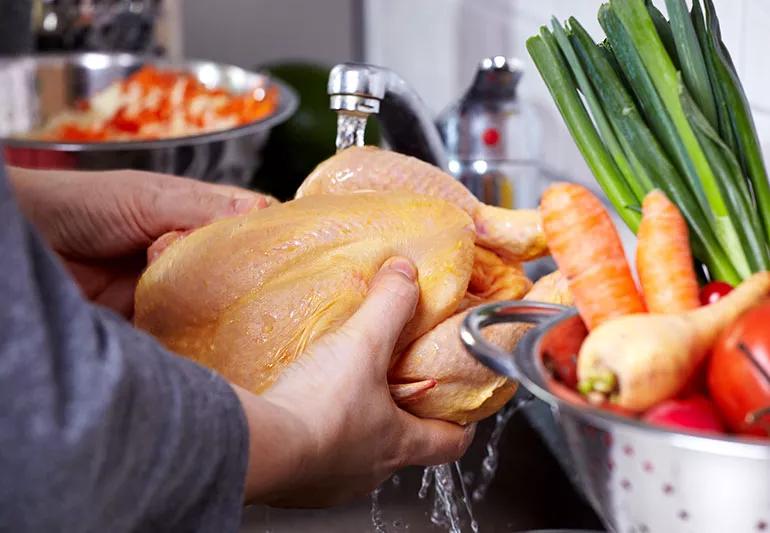The short answer from an expert

Image content: This image is available to view online.
View image online (https://assets.clevelandclinic.org/transform/17f5736e-1860-4b30-a103-ca60772e8bf7/WashingChicken_183810736_770x533_jpg)
man washing chicken in the sink
A: In a word, no.
Advertisement
Cleveland Clinic is a non-profit academic medical center. Advertising on our site helps support our mission. We do not endorse non-Cleveland Clinic products or services. Policy
It may seem counter-intuitive to some people, but washing your chicken can actually lead to an increased risk of illness.
The biggest concern with washing raw chicken is the increased risk of spreading foodborne illnesses. Raw chicken and its juices can carry harmful bacteria like Campylobacter or Salmonella, both of which can cause food-borne illness.
When you rinse your chicken under running water, there’s a risk of splashing water that carries that juice – and, therefore, that bacteria – around your sink, your cutlery, nearby food, produce and anything else you have in the vicinity.
If you want to cut down on those juices before cooking, though, you can pat raw poultry with a paper towel as long as you properly dispose of the paper towels and wash your hands immediately afterward. The key is preventing the spread of those raw juices.
To cut down on the risk of spreading harmful bacteria, follow these steps when preparing raw chicken:
Advertisement
— Registered Dietitian Nicole Hopsecger, RD
Advertisement

Delivered every Tuesday!
Sign up for our Health Essentials emails for expert guidance on nutrition, fitness, sleep, skin care and more
It's a letter about the news!
Learn more about our editorial process.
Advertisement
This entrée packs plenty of flavor — and plenty of health benefits
Indian-inspired flavors on the grill
Love Italian? Try this classic family favorite
A low-calorie, high-energy lunch
A quick and easy heart-healthy meal
A lighter sort of comfort food
Quick, hot and healthy
Bored with roast chicken? Let us help you with that!
Type 2 diabetes isn’t inevitable with these dietary changes
Applying a hot or cold compress can help with pain
Pump up your iron intake with foods like tuna, tofu and turkey